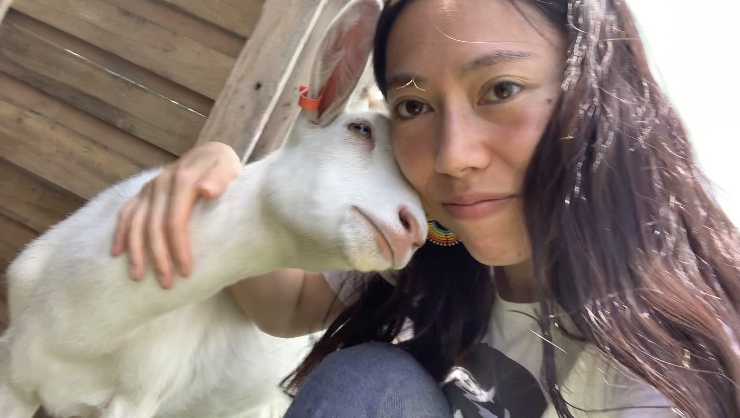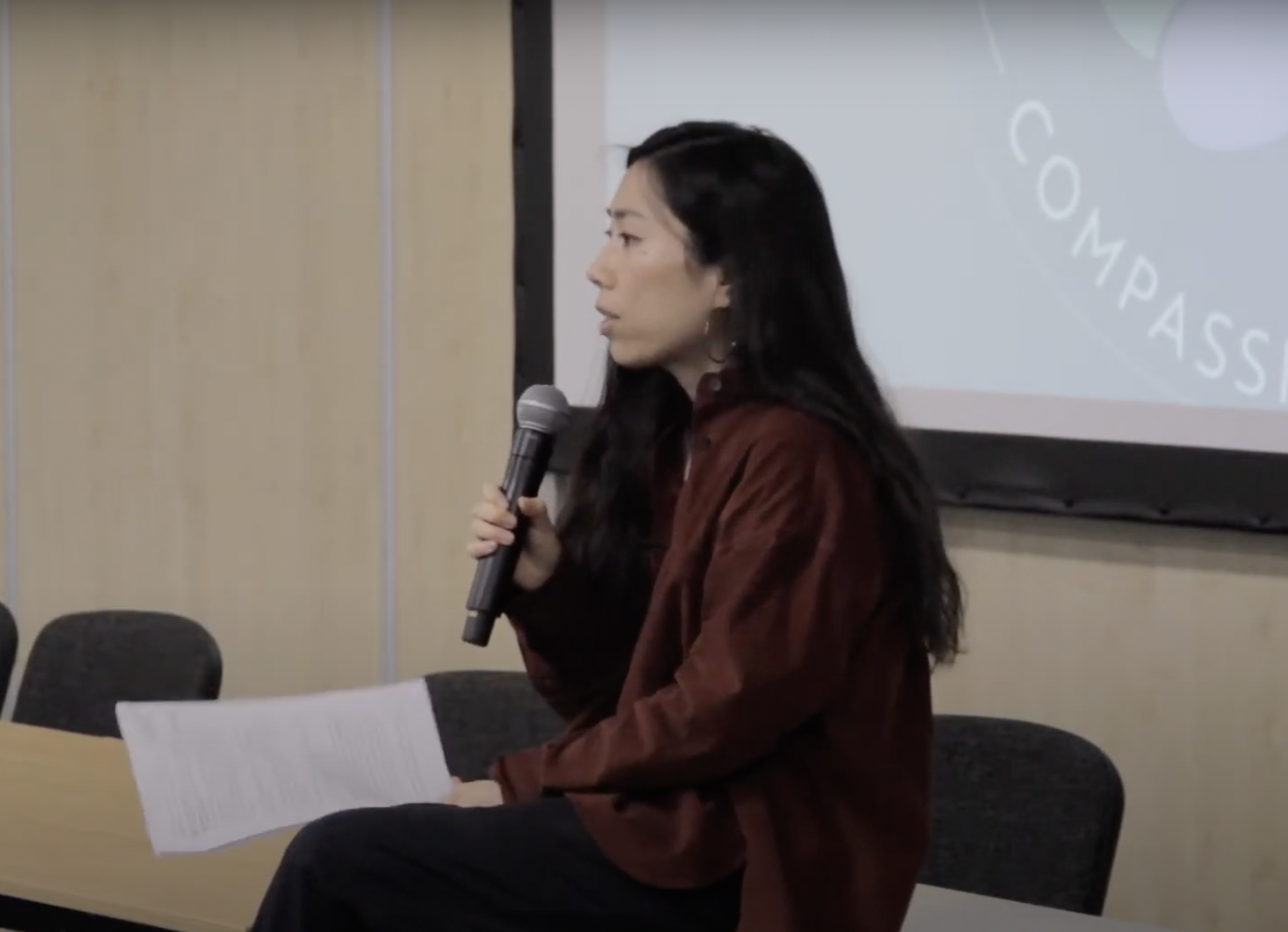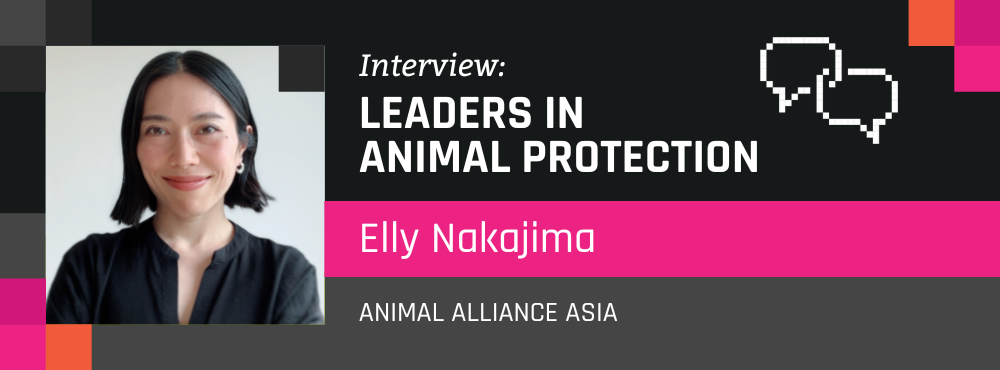Leaders in Animal Protection: Elly Nakajima
Elly Nakajima is co-founder and director of Animal Alliance Asia — building a movement that’s more inclusive, effective and sustainable in Asia by supporting, training and mentoring advocates and organizations across Asia and forming a regional coalition. Through AAA, she launched Animal Advocacy Conference Asia, the first conference by, and for, animal justice advocates in Asia and the Animal Advocacy Academy in five languages.
Prior to founding AAA, Elly worked for 10 years in filmmaking and media, and applied this experience to become one of the first Japanese language educational content providers for vegan advocates in Japan.
First and foremost, we want to get to know you and your personal journey to veganism. What sparked your interest in a vegan lifestyle and advocating for animals?
One of my earliest memories was going with my mother to a local supermarket in Tokyo, where they sold birds as companion animals. I remember my heart aching whenever I passed them and saw them in tiny cages. Although I was still about four years old, my response was to devise a liberation project. I remember using my notebook to plan the details, from how to get there when no one was around, how to unlock the cages and where the birds could go and live instead. Of course, my mother discouraged me from carrying out this grand mission. Looking back at this now, I think it shows I had compassion towards non-human animals from when I was very young. However, like many people, I unquestioningly kept consuming animals.
It wasn’t until I was in my late twenties that I made the connection with my consumption habits and animal suffering. The first step towards making the connection was seeing footage of beagles who had been subjected to animal testing coming out of cages for the first time, not knowing how to walk on grass. Having grown up with a beagle, it affected me greatly to witness them being so scared and traumatised. After this, I stopped consuming products without cruelty-free certificates, and began to realise I wasn’t comfortable consuming any animals. As soon as I was vegan, I started advocating for animals, both in English and Japanese.
I have to acknowledge the fact that my process of becoming vegan took place in London, which is said to be the most vegan-friendly city in the world. I came to recognise that it’s not as easy to ‘go vegan’ for everybody, because there can be so many different barriers including cultural, economic, religious, political, historical and geographical nuances - which is why I decided to co-found Animal Alliance Asia.
We love that AAA is invested in creating leaders in vegan advocacy—one that is more diverse, inclusive, and culturally-appropriate. Given your upbringing in Japan and higher education in Europe, what have you found to be the differences in approaches to animal advocacy and activism between Western countries and Asian countries?
This is a big question! To set the scene, perhaps we could ask readers to step back and ask ourselves this: how many animal advocate leader figures in Asia do I know? If it’s not very many, why is that, and does that indicate that there is a wider issue to address?
In my own experience, as someone who grew up in Japan but first became involved in the animal justice movement while living in the UK, I’ve learnt a lot from the advocate communities in the European animal justice tradition that has been developing for decades.
At the same time, it was clear to me that the experiences and voices of advocates of the global majority were extremely underrepresented. I also noticed that bilingual English-speaking advocates across Asia relied heavily on online resources, leadership figures, and approaches to advocacy from English-speaking countries, which then get directly translated into their languages for advocates who don’t speak English. Of course, certain Western-orientated priorities, tactics, campaign ideas, and datasets cannot necessarily be applied as a direct blueprint across Asia.
As above, one element is the issue of language justice. Asia is an extremely diverse continent and boasts the largest population in the world—we are the majority of the global population and I’m excited for the creative and diverse movement we are building in Asia. Why is it then that our movement is mostly learning from English-speaking countries and not learning from diverse approaches and tactics from the rest of the world?
With that question in mind, how did these differences lend themselves to the establishment and vision set forth by Animal Alliance Asia (AAA)?
I wanted to create a space to foster a space to explore what a truly diverse animal justice movement looks like. This is why I co-founded AAA in 2019.
What we have been learning through our work is just how rich and complex our cultural, historical, political and religious layers are throughout Asia that add unique challenges to our advocacy. It requires our advocacy to be hugely more inclusive and not just assimilate.
Through our programs, advocates from several countries have shared their experiences on how the advocates from the West have tried to pressurize local communities in their countries without thoroughly understanding the cultural and historical nuances. This ends up imposing ideologies and preconceived notions of what works best. Of course these dynamics don’t last and don’t end well.
The underlying issue seemed to be the lack of peer support network and local educational opportunities. As such, we strive to foster mutual respect and trust with movement builders on the ground. This is why our team is made of people in and from Asia. This is our home and we are here for the long haul to build long-term movements. Genuine empowerment of local movements means we cannot repeat some of the imposed dynamics that people have experienced. We believe we can best address these issues by having consistent anti-oppression as our core value. We understand that our advocacy needs to be more inclusive, local-led, and not just assimilating into the current mainstream movement. Decolonizing our relationships with food and non-human animals is crucial.
We wanted to offer a platform and network that empowers and engages advocates across Asia to learn, experiment, and develop new tactics and approaches going forward. I hope that the building of a diverse and creative movement that’s empowered from within Asia will benefit non-human animals.

Given the incredibly diverse cultures and communities within Asia, what does animal advocacy look like? Can you share with us what are the unique opportunities and challenges that you and your team have encountered?
When we talk about animal or vegan advocacy in Asia, it’s important to understand and unpack the complex layers of factors behind resistance to the concept of veganism or animal justice, which vary from region to region, community to community. These layers could be indigenous cultures, religions, languages, the history of colonialism, socio-political climate, and influence of relatively new Western-inspired consumerism, to name a few.
This is why we are working towards building strong local leadership from every community— Muslims, Buddhists to Indigenous—who understand society’s widely-held values and who can find a way to integrate them into our advocacy.
The notion of tradition seems to be a key obstacle in many areas, from annual religious sacrifice to cooking methods that are considered authentic. Naturally, it’s not easy to debate religion in religious communities. Instead of challenging it, some advocates are trying to find a way to integrate some values from the religion into their advocacy.
The history of colonialism and post-colonial culture have a huge part to play in people’s relationships with food and non-human animals. Western inspired eating habits, such as eating eggs for breakfast and having meat at family occasions as a symbol of wealth, are seen as the new norm in many parts of Asia. So food empowerment is another important aspect of our advocacy we need to work on. It requires a lot of unlearning and empowering ourselves with our own, more sustainable, healthy and compassionate food system that we long had across Asia.
There are 48 countries across Asia, and many countries have extremely complex community structures of nomadic tribes, village systems, different practices and sects within religions (and to give you an idea, within India there are over 20 official languages and over 70 regional languages in Pakistan!) Historically marginalized communities are often associated with animal slaughter in many parts of Asia, and our advocacy needs to be respectful to all communities and approach these issues with humility.
This is why we need leadership in every corner of Asia.
Of course, the current political unrest in many parts of Asia is another huge aspect we cannot ignore, many as the ongoing legacy of colonialism. Basic human rights are at stake for many communities as a result of oppressive history. A single-issue approach can cause further resistance to our cause in such contexts.
Your team includes country representatives from so many countries, including Pakistan, India, Hong Kong, Japan, Indonesia, Myanmar, and Taiwan. How is AAA supporting the work of these advocates?
Our team has been growing organically as our network expands. We are working to welcome new team members from more underrepresented countries right now. Please check out our website for more information, if you are interested or know anyone who might be interested in joining our team!
AAA has been holding our annual Animal Advocacy Conference Asia since 2020 and we have had over 40 workshops in seven Asian languages and had over 1,500 attendees (cumulative) from over 50 countries. We’ve received overwhelmingly positive feedback from our participants on how this space was desperately needed. We are excited to have heard from some of our participants how they have applied the knowledge and skills they learned from our conference to their advocacy on the ground and started new initiatives.
We are expanding our work including our upcoming Academy, research to help us understand these issues better, setting up a knowledge-share hub, and building a coalition of organizations across Asia.
In certain parts of Asia, there is a history of vegetarianism due to Buddhism and Hinduism. While it may vary by country, how do you think veganism, a term and movement which originated in the UK, has been received in the countries where AAA has a presence? How does AAA approach these viewpoints?
Indeed, both religion and language seem to play a huge part in shaping our advocacy, and this is something our advocacy needs to integrate, and not ignore or exclude.
The English word “veganism” has certainly started gaining traction in many of the Asian countries now. Many countries do not have a term in their language that expresses veganism as a concept, therefore the English term “veganism” is usually used in our advocacy. This is causing confusion and resistance in some areas.
In some languages, there’s a word to express “pure vegetarian diet,” often associated with certain religious practices. So people associate the relatively new foreign word “vegan” to this religious concept, and those who don’t identify with that religion therefore often turn away.
Because it’s an English word, the term “veganism” is also often associated with an elite lifestyle that only people with certain privileges can afford, and the social justice element is often not communicated well. Because of this, many communities are excluded from the movement. To tackle this, there are some inspiring initiatives to create a new alternative word in their language to express veganism.
Interestingly, despite how many people may view Buddhism as a religion of peace that’s based on the “thou shall not kill” principles, it’s a little bit more complicated than that. For example, some communities believe in reincarnation and karma where people with bad deeds would come back into the world with some kind of disadvantage, such as living in poverty or living as non-human animals. This justifies speciesism and the concept of animal rights or welfare becomes harder to accept.
Similarly, Hinduism places certain non-human animals on the ladder of caste system along with certain human communities, based on the notion of purity. Last year, we had the opportunity to invite a speaker who spoke about how Hinduism influences our advocacy and how veganism can inadvertently oppress marginalized communities in India. So we need to think about how the anti-caste movement and animal justice movement can work together to dismantle this oppressive system.

We are so excited to see a multilingual course like Animal Advocacy Academy, which aims to equip activists, advocates, and anyone along their vegan journey to become more effective in the movement. Given its broad-based target audience, what is your definition of success for the Academy?
We are very happy to be rolling out our Animal Advocacy Academy in five languages this year! Language injustice is something we constantly strive to tackle at AAA—so we are designing a program where participants can learn animal and vegan advocacy in their own language, about advocacy skills that’s relevant to their cultural context. We will also be inviting guest speakers from each country for some of our workshops.
One of our core values is openness to learning. We don’t pretend that we know everything. We believe that knowledge and expertise already live within the people on the ground doing the work. We are designing our Academy so that the participants have plenty of opportunities to reflect on their own advocacy and share their experiences.
We have designed our Academy in a format of a journey that takes the participants through different stages of being a vegan or an animal advocate, starting with how to communicate about veganism more effectively. Then we will guide them to take a step back to look at a bigger picture of where our movement is and what roles they are playing. Finally, we will invite the participants to work on a strategy plan for their advocacy and set goals they want to achieve.
Empowering strong local leadership is the goal of our Academy, and we hope this will be an opportunity for advocates and local organizations to connect with each other to start a potential collaborative work together. My hope is participants will become stronger, more confident and effective, and above all more united, for non-human animals.
Thank you so much for your wise words, Elly!

